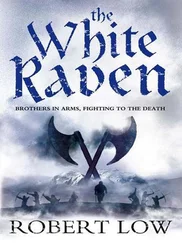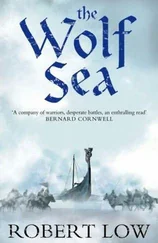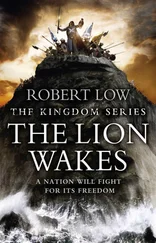`Right enough,' agreed Short Eldgrim.
I hoped not—but no one suggested I throw the sabre back, so I stayed quiet. They had rescued three ponies and some supplies and a dozen men, those fit enough actually to run for it. All the rest had died, were rolling and tumbling in the maelstrom of muddy water.
There was no rain that day, so we made a fire and I watched what was left of them huddle round it, beyond my hearing, talking. I knew what they were doing and, with a black despair, what I would do when they came to me, their secret whisperings done. I did not care about that: I had my own secret.
It was done simply enough the next day. It had rained then, just when I thought we couldn't be more miserable and I was sitting in it, enduring, when Kvasir came to me and hunkered down where I sat tracing the runes along the sabre's shining, watered blade. Ridill or Hrotti, I wondered.
`Scrubbed up well, that sticker,' he grunted, cautiously probing his red eye, which now leaked green pus and was blind, I knew, from the way he cocked his head.
The rest of them had sabres, too, stripped from cavalrymen who had attacked us, but no one thought much of them—a pig-sticker, too light and pointed for men who fought with the double slashing edge. None were like this one, but if any of the others noticed that, they bit down on it and stayed silent.
I turned the blade in the pearl light of the wet day and agreed it had scrubbed up well, knowing that it was as different from the other sabres we had as night from day.
Eventually, Kvasir cleared his throat and said, 'So, will you lead us then, now that Einar has gone?'
So it was done, despite the fact that the youngest of them was older than me by a decade. I was Orm the White-bear Slayer, who had survived the howe of Attila.
I was sick with it, though. We stood in the hissing wind of that bare steppe and I sacrificed a hare on a rock, as I had seen Illugi do an age ago on the beach at Birka—and it was a sacrifice, for getting the thing was hard enough, let alone not eating it.
Then we looked at each other across the acrid fur-burning stink and nodded and spoke the words together.
`We swear to be brothers to each other, bone, blood and steel. On Gungnir, Odin's spear, we swear, may he curse us to the Nine Realms and beyond if we break this faith, one to another.'
A hard oath to swear. To break it now, I would have to become a Christ-follower in Constantinople, or find some fool to take my place—and who could replace the jarl without killing him first?
But I was young and dared to think I could spit in All-Father's one eye.
My first jarl test came when horsemen thundered up to us on the steppe, as we squelched miserably towards the Don. They were a cautious, fur-clad, flat-nosed, fierce-looking bunch of Kipchak dogs who had never seen our like before—which was our good luck.
They stopped some way beyond long arrow-shot and considered us. Their bows were uncased, but no arrows were nocked, which gave me hope.
`They could shoot us down like sheep in a pen,' Kvasir said, his voice tight, his shield up.
'But they have not,' I answered and jerked my downy chin at the rider who had broken away from them and was ambling his scraggy pony towards us, his hands up and clear of his body.
`They want to talk,' Finn Horsehead said. `Maybe we can frighten them into letting us pass without a fight.'
I looked at him; he was serious. I looked at the rest of them, this tattered band of grim men, prepared to fight and die. I shook my head, half in sorrow at their thick heads, half in sorrow for what I realised, even then, was passing.
`There is another way, I am thinking,' I said, pulling off my boots and spilling out the ringmoney, the brooches, the coins that would have pulled me down but for Short Eldgrim's rope. My secret.
They gaped, circle-mouthed. I grinned back at them.
'Now we trade,' I said.
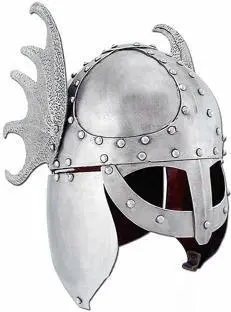
In the light of the dancing lantern, guttering fish-oil smoke that was whipped away by the wind, only their eyes gleamed as they hunkered down out of the spray at one end of the ship.
I felt those eyes like brands but tried to ignore them, concentrating on the Greek captain and staring at him in turn, until he felt the burn of my eyes and whirled on his men, barking angry and pointless orders in his unease.
He had taken us aboard in two minds, that captain, caught between greed and fear. On the one hand, we had paid him well and stacked all our weapons—save mine—and that reassured him.
On the other, he knew what we were, suspected we were deserters from the Rus army at Sarkel and knew that, even armed with just eating knives and horn spoons, we might try to take his ship.
Finn suggested as much, hissing it in my ear, and they waited for my signal, huddled and miserable. I would not give it, for I was not about to risk my life for a filthy little coastal fish-trader like this.
Sarkel had fallen, the captain told us, trying to judge our reaction to that news. No one blinked much at it—what was Sarkel now to us? We had no ship and were crushed with loss. We could not set foot in the Rus lands now, so the only safe place was the Great City, where we had no prospects.
Well, that last was not quite true and Kvasir voiced it for all. He hunched himself up by my side, the wind whipping the greasy tangles of his hair. 'You have the right of it, Trader,' he growled, ducking as the spray lashed us. 'This is not the ship for us.'
`Just so,' Finn echoed. 'What we need is a solid knarr. Or one of those Greek dromon ships.'
À big-bellied one,' agreed Short Eldgrim, picking a scab on his face. 'That can carry a lot. There are many in Miklagard.'
Ànd some more good men,' offered Sighvat. 'Good Norsemen or Slavs, not afraid of a hard oath.'
And they grinned like wolves, yellow-fanged in the dark, so that my stomach turned over.
I knew why they needed all this, and were looking to me to come up with a deep-minded plan to get it. I sat in the salt-slick wind, feeling the bite of it, the damp seeping through the stained wool of my tunic and the despair settling on me like morning haar in a fjord.
It was what they did—what they were . The fear they had felt just weeks before had eased, leaving only the lure of what was still out there to be found. You could not be a Northman, have the knowledge of a mountain of silver and simply leave it there.
They had not seen what I had seen and none of my horror tales of Hild's fetch would keep them from going back.
We were still on the whale road and, in the wind that keened and thrummed the ropes, I swore I could hear Odin laugh.
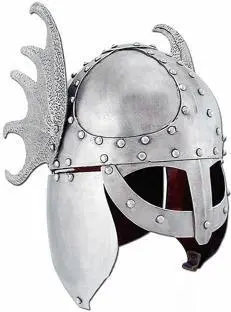
The Whale Road is set in and around the year 965 AD, an era when the line of kings in Norway and Denmark is confidently set out by historians and, for the same era, the nation that would end up as Sweden is generally marked as 'chaos and confusion', with not even the names of the protagonists known for certain.
More confidently, the history of several hundred years earlier does record that Attila died on the night of his wedding to Ildico, who was found beside the bloody corpse the next day. No one knows where he is actually interred, though the Hungarians make the loudest claim for it, at the same time as repudiating that the Hun part of their name has anything to do with that barbarous tribe. I prefer the idea of his being interred out on the open steppe, but that is pure invention on my part.
Читать дальше
Конец ознакомительного отрывка
Купить книгу





